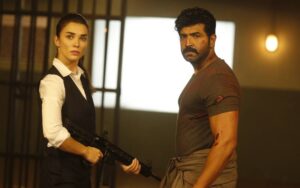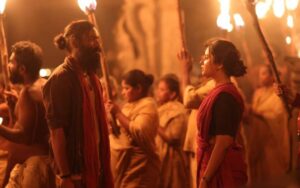Review: Magamuni

Film: Magamuni
Producer: Gnanavel Raja
Director: Santhakumar
Cast: Arya, Mahima Nambiar, Indhuja, Ilavarasu, Jayaprakash, Aruldoss and others
Music: Thaman
Cinematographer:Arun Bathmanaban
Editor: V J Sabu Joseph
Rating : 4 stars
Make no mistake, this film is a classic! With Magamuni, director Santhakumar proves beyond doubt that the success of his first film, Mounaguru, was no fluke and that he possesses in him all the skills required to make a film that is deep, meaningful, intense and socially relevant on the one hand and interesting and entertaining on the other.
Magamuni is refreshing in any which way you look at it. The story revolves around two individuals. One is called Maga, a call taxi driver who also does odd jobs for an unscrupulous politician called Muthuraj (Ilavarasu). Muthuraj in reality is a miserable creature who was originally a real estate broker before turning a politician.
The other is called Muni, a deeply spiritual guy who lives the life of an ascetic with his mother (Rohini), tending to his fields and teaching children from less fortunate backgrounds.
Maga’s speciality is his ability to plot either a killing or a kidnapping to perfection. In local parlance, he is the one who makes the ‘sketch’ for a crime, everytime Muthuraj wants somebody taken care of. Maga’s world revolves around his wife, Viji(Indhuja), and their son. He knows very well that Viji and his son Prabha are completely dependent on him for their survival and he cares more about their wellbeing than he cares for his life.
Muni, on the other hand, is a well read, deeply spirutual organic farmer who has his priorities right in life. What is more, his wisdom gained by his deeper understanding of ideas and idealogies and his knowledge gained by studying books and people make him aspire to be a bramhachari. Muni uses yoga to keep his physical urges under check and has lofty ideals. Although Muni pretty much keeps to himself and his task of teaching, his wisdom draws Deepa (Mahima Nambiar) a journalism student who is also the daughter of Jeyaraman, a wealthy businessman from one of the upper castes, to him.
While Deepa’s interest in Muni triggers certain developments in his life, Maga’s past comes to haunt him. What happens then is what Magamuni is all about…
Director Santha Kumar might have taken eight years to pen this script but it is definitely worth the wait.
Every single dialogue, every single scene has something significant to convey, if you are smart enough to sense and secure it.
For instance, there is a scene in the film in which Maga is shown struggling to maintain his composure even as his body shivers. A little later, as the camera slowly swings, you realise that he has been stabbed and that the dagger with rugged edges is well entrenched into his shoulder and is still sticking out.
Another director might have made the actor scream in pain or die instantly to show the intensity of the wound. Not Santhakumar. He makes Maga show just a little emotion to make us realise the intensity of the pain that he is experiencing but at the same time, makes Maga react exactly like how a man from any middle class family would under such circumstances.
Maga doesn’t make a big deal of it despite it being a life threating situation for him. His conversation with a quack (Kali Venkat) is priceless. Kali explains that the the dagger which has been sunk into him a good five inches deep cannot be removed without surgery as it has rugged edges like a saw. He points out that trying to remove the dagger without surgery could kill him as the rugged edges could cut through tissue and muscle as it is being pulled out and offers to perform a surgery for Rs 5000 for their friendship’s sake. The surgery would under normal circumstances cost him Rs 10,000, he informs.
To this, Maga replies that he cannot spare so much for his life and that he would rather undergo the pain of having the dagger pulled out, even if it means having the tissues and muscles getting cut and having to bear the pain. He begs him to do it for Rs 1000!
What Santhakumar is looking to showcase in this sequence is the pain of the ordinary middle class man on the street, who suffers immense pain because of the backstabbing that he encounters everyday but looks to provide for others who are dependent on him without showing the pain he is in.
There is another sequence in the film in which he goes back home, almost half dead after having the dagger pulled out. He is still in immense pain but shows nothing of it while his wife, Viji, throws tantrums about him not having come home the previous night. She makes a big hue and cry about how their son has been beaten at school by a teacher and says that she has been suffering immensely because of a bad head ache. She demands that Maga take their child to school and give the teacher an earful while she insists that she needs to rest. Maga tries reasoning with his wife about how tired he is but then, gives in to her tantrums and goes to school with his son where he handles the problem in a mature way.
This again is what most middle class men do. While most men suffer pain that is several times more intense than that of their wives who stay at home, they show nothing of it. While the women do the exact opposite! I could go on and on and on about how each sequence has been beautifully crafted to bring out one point or the other.
Magamuni brings out many issues in the course of narrating interesting incidents in the lives of two individuals. It talks about casteism and its evils at one point, talks about corruption and politicians at another. It highlights the pain of the middle class people at several points and then talks about how the working class is denied of its pay by those in a position of power. It showcases exploitation, manipulation, backstabbing, collusion and opportunism at every level and stage in a manner no film has shown before.
Santhakumar’s dialogues are deep and provoking. They are delightfully honest and strikingly sincere. There is one scene where Muni defines ‘Rajathanthiram’. The definition is priceless. This man is one who needs to be celebrated.
Moving on to the cast, Arya comes up with a splendid performance. Easily the best of his career, he impresses both as Maga as well as Muni. While you are bound to be impressed more by Muni’s characterisation, you cannot but ignore the effort the actor has put in to bring Maga to life. Outstanding job, Arya!
Mahima Nambiar as Deepa is brilliant! She plays a revolting, fair-minded, outspoken, independent woman of character and boy, does she excel! Mahima comes up with so strong a performance that she now automatically moves into that league of artistes who can handle heavy, demanding roles. Her make up, her dialogues, her attitude all add up and there is not a single point that you can make against her performance. What a star!
Indhuja plays to perfection the insecure, completely dependent and to an extent, self-centred Viji who wishes for her husband’s well being because her well being and her child’s well being depend on it.
On the technical front, Thaman proves yet again that he is the master of background scores. His background score is so perfect that one cannot think of any other music to go along with the scenes of the film. His music literally blends into the film so much that you cannot think of the visuals without them!
Arun Bathmanabhan’s skill at handling the camera is more than evident from some of the striking visuals of this film. However, the story and its screenplay is so engaging that your attention is more on that than it is on the visuals.
To cut a long story short, Magamuni is a masterpiece worth celebrating!





